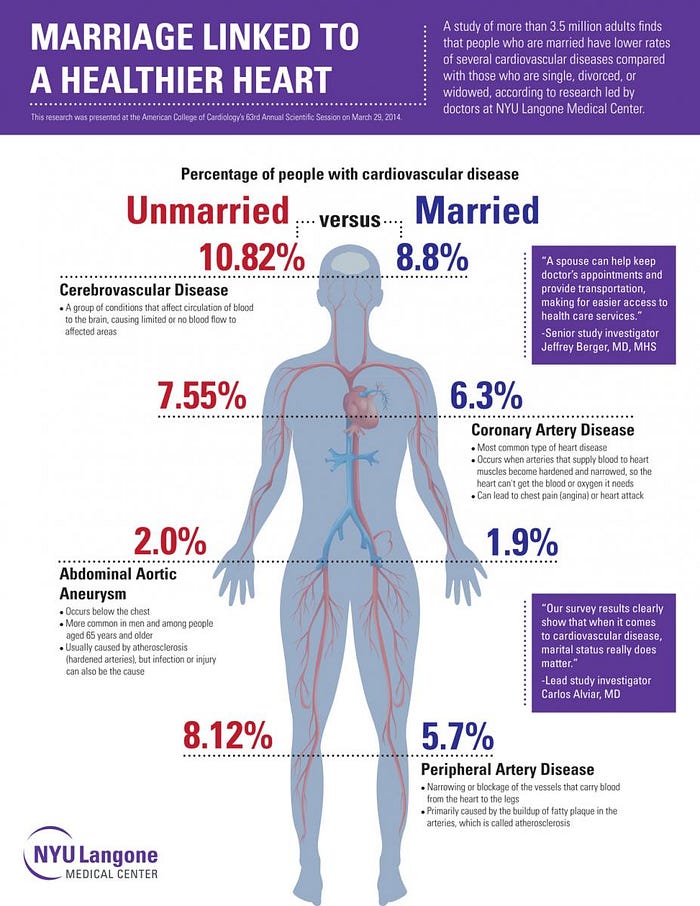NYU Langone Finds Marriage Is Good For The Heart — Literally
By Catherine Addington

Want to avoid heart disease? Marry, and marry young.
That’s the implication of the latest major research findings announced by NYU Langone Medical Center, as presented to the American College of Cardiology this past Saturday, March 29. After analyzing heart-related survey data about 3.5 million American men and women collected from approximately 20,000 health centers across the country from 2004 to 2008, researchers came to a statistically sharp conclusion. The researchers found that married people were significantly less likely to have any kind of cardiovascular disease than single, divorced, or widowed people — regardless of age, sex, or even cardiovascular risk factors.
According to NYU Langone, “being married carried a 5 percent lower risk of having any cardiovascular disease than being single,” while “widowed and divorced people were, respectively, 3 percent and 5 percent more likely to suffer from any kind of cardiovascular disease.” The gap between married and non-married was even wider in people under 50.
Senior study investigator and NYU Langone cardiologist Jeffrey Berger summed up the study by saying, “Our survey results clearly show that when it comes to cardiovascular disease, marital status does indeed matter.” He concluded that the study indicates a need for clinicians to include marital status in the factors they consider when evaluating patients’ heart problems.
Why the link? Dr. Berger said more research is necessary, but he conjectured that marriage reduces behaviors that are medically risky by providing an emotional and physical support system. “Married people can look after each other, making sure their spouse eats healthy, exercises regularly, and takes medication as prescribed,” he said. “A spouse can also help keep doctors’ appointments and provide transportation, making for easier access to health care services.”

Another lead study investigator, NYU Langone cardiology fellow Carlos Alviar, said that the size of the study was a major reason for its trustworthiness and usefulness. The researchers accounted for known predictors of heart disease, looked at different age groups, and did not attempt to disentangle marital status and overall disease risk from other factors. Instead, they looked at the whole picture, and marital status was the one factor that stood out as a definitive characteristic of different risk levels.
In short, this does not mean marriage is a definite measure of heart health; it just means that it is correlated to healthier behaviors. Or, as cardiologist Dr. Vera Bittner put it, heart disease risks are not just a matter of physical assessments. Dr. Bittner, who heads the heart disease prevention committee of the American College of Cardiology, emphasized that social factors and stress are now being taken into consideration when evaluating heart health risks, and this also allows for and helps explain fluctuation in those risks over time.
This is just the first of several analyses that Drs. Berger and Alviar plan to undertake using these data. They intend to differentiate marital status and reduced risk by race, especially since over 80 percent of study participants were white, as well as the role of socioeconomic factors like education and employment status.
NYU Langone funded the yearlong statistical analysis, which in addition to Drs. Berger and Alviar included NYU Langone researchers Caron Rockman, Yu Guo, and Mark Adelman.

